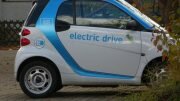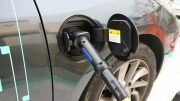On Wednesday, the Norwegian Electric Car Association (Norsk elbilforening) announced that the number of electric cars on Norwegian roads had exceeded 500,000.
The Association takes pride in this environmentally friendly development in Norway and hopes that the rest of the world will follow suit.
In the wake of this important milestone, Norway Today reached out to Christina Bu, Secretary-General of the Norwegian Electric Vehicle Association, to find out what she thinks about recent development in electric vehicle adoption in Norway and the Association’s plans for the future.
NT: According to the recent figures published by Elbilforeningen, the number of electric cars on Norwegian roads has now exceeded 500,000. How do you comment on this milestone?
CB: We Norwegians and especially us in the Norwegian EV Association, are extremely proud of this development. We hope that the rest of the world will follow up so that we eventually are able to replace a very polluting car fleet. The transition to an emission-free car fleet is one of the most efficient climate efforts there is.
NT: How would you describe the conditions that electric car owners in Norway face today?
CB: The Norwegian success story is first and foremost due to a substantial package of strong demand-side policies developed to promote zero-emission vehicles into the market. The incentives have been gradually introduced by different governments and broad coalitions of parties since the early 1990s to speed up the transition.
The key is that the government taxes the sales of new polluting cars heavily but does not tax EVs at all, making EVs, which are more expensive because of their production costs, a competitive and appealing option. Furthermore, the Norwegian parliament has decided that counties and municipalities can not charge more than 50% of the price for fossil fuel cars on ferries, public parking, and toll roads.
The overall signal is that it should always be economically beneficial to choose zero and low-emission cars. The Norwegian parliament has also decided that all sales of new cars and vans shall be zero-emission by 2025. The faster we shift the sales of new cars to 100% electric, the faster we get there with all cars on the road.
When it comes to charging infrastructure in Norway, we now almost have a national network of fast chargers that cover all main roads. This has mostly been constructed by commercial companies with little state funding, but recently NOK 100 million was allocated to close the remaining gaps in the charging infrastructure.
Furthermore, we, the Norwegian EV Association, are working towards a continued increase in the construction of chargers in the years to come, and we are working for an easier payment method when you charge your car. That is why we have asked the government to adopt regulations that allow the consumers to pay with a credit card directly on the fast chargers. Charging should be as easy as refueling your car.
NT: How would you describe the current government’s policies when it comes to supporting this development? Is there any risk of backtracking if the ambition decreases?
CB: The current government is working towards the goal that the parliament has adopted, namely that all new cars should be emission-free by 2025, but the current government wants to introduce a VAT on parts of the price of the most expensive cars.
We have long warned against introducing VAT on electric vehicles too soon because it can affect consumer behavior. Today, the most expensive cars are often the cars that are well suited in rural areas of Norway. We do not think the government should adopt policies that make it less attractive to choose zero and low emission cars than choosing the relevant substitutes that run on fossil fuels.
NT: The Norwegian Public Roads Administration recently proposed several measures to get people to use public transport again. Among other things, they proposed cuts in electric car benefits. How do you comment on this proposal?
CB: We agree that it is important that people travel in and out of our cities by public transportation. We think the biggest obstacle is new habits that have emerged after the pandemic, like the increased use of home offices, not the electric cars.
The policy package promoting the transition to electric vehicles is the most effective climate effort there is, and the main competitors to the electric car are petrol and diesel cars. EV incentives when driving on toll roads are important incentives put in place to encourage people to switch from petrol and diesel cars – to electric cars.
NT: What should be done to ensure that the shift to electric cars in Norway “sticks”?
CB: To achieve a successful transition to an electric car fleet, there must be good access to charging stations across the country with simple payment solutions.
Robin-Ivan Capar is a contributor and editor at Norway Today.
Source: #Norway Today / #NorwayTodayNews
Do you have a news tip for Norway Today? We want to hear it. Get in touch at [email protected]





If the Norwegian government starts cutting enefits to Eelectric car owners it means it is contradicting what it has been saying about enviromental isues. I think this issue needs rethinking. It is important the government stands by what it said earlier.